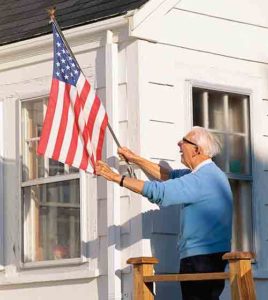Years ago I traveled to Maine to officiate at the wedding of a friend whom I met when I was in Washington, D.C. His fiancé grew up on an island just off the coast. She was the daughter of a lobsterman. The setting made for a beautiful weekend of wedding events, but it also made for a difficult travel itinerary.
 In order to fit everything in for a July 6 wedding, most of the out of town guests chose to come to the island on July 3. Who am I to pass up a couple extra days in a picturesque New England fishing village? To further set the stage, at one point the men of the wedding party and I joined the bride’s dad on his fishing boat to literally “catch” the rehearsal dinner.
In order to fit everything in for a July 6 wedding, most of the out of town guests chose to come to the island on July 3. Who am I to pass up a couple extra days in a picturesque New England fishing village? To further set the stage, at one point the men of the wedding party and I joined the bride’s dad on his fishing boat to literally “catch” the rehearsal dinner.
A highlight of the weekend had to be the village’s Fourth of July parade. The family was so proud of their village’s patriotic festivities. They were assertive in their desire that we all attend. Our group (clearly out-of-towners) found a nice spot on Main Street in front of the hardware store to view the parade.

(Thinkstock.com)
Just a few minutes after the scheduled start, the front of the parade was reaching us. Taking the lead was a color guard of five Boy Scouts. They were cheered, and they were proud of their role in the celebration. The tallest boy was in the center carrying the American flag.
I surmise he was told to remain stone-faced and looking straight ahead. He was flanked by scouts carrying the state flag, and the troop’s flag. On the ends were the youngest, and the shortest, scouts holding the ends of a pole carrying the banner announcing the parade. These two hadn’t gotten the message about being stoned-faced as they were all smiles and waving at those cheering them.
I have to admit that I grinned a bit when I noticed that the Scout closest to us was in what had to be a hand-me-down uniform. The shirt was too big; old patches had been removed, and the green uniform pants were rolled up at his ankles. One guesses that mom and boy were both waiting for him to grow into an older brother’s clothes.
The parade was refreshingly typical – a marching band from the small high school; a cohort of tykes on decorated tricycles; thematic floats from civic organizations; and politicians in convertibles with insurance agent advertisements on the doors.
At the end of the parade was another color guard. This one made up of veterans in uniform. At the center was a Marine carrying the American flag. He stood tall, straight-backed, and stared forward every step of the way. There was a Navy officer with the flag of the local American Legion post, and on the ends were to two older men in World War II vintage Army uniforms.
The older man (wearing the stripes of a sergeant) who passed closest to us was hunched over just a bit. He smiled with great pride as people cheered. He saluted anyone one who saluted him. He stood just as tall as he could, but his 60-year old uniform hung very loose on his 80-year old body.
Ironically, as the impact of time has on a man, his once perfectly fitting uniform trousers now had to be rolled up a little at the ankles.
As we thought the parade was ending, we started milling about and gathering our folding chairs. But, the bride’s mom was quick to tell us “Wait, we can’t go yet. They just go down to the high school and then the parade turns around and comes back the other way!” It was great to be in a small town.
Walking around after the parade, we passed the church in the heart of the village where the wedding would take place, as well as the barber shop with the candy cane sign that was opening special on Saturday morning for the bride’s dad (and any of the men) to get a trim before the ceremony.
The weekend was a heartwarming encounter with Americana. It became an intersection of God, family and country which spoke to the values we all should treasure.
By the time of the Saturday afternoon wedding, and again at the Mass I celebrated in the local parish on Sunday morning, I added to my homily reflections. In America, religious and civic life are supposed to intersect in hope and promise.
Religious freedom makes it possible for our churches to proclaim true freedom and true hope. Personal freedoms make it possible for every citizen, young or old, to take a rightful and properly prideful place of example in the community.
Only in small-town, faith-filled America, can rolled up uniform pants represent both hope for the future, and a life well lived. With our Catholic faith, rolled up pants can be a herald of hope.
